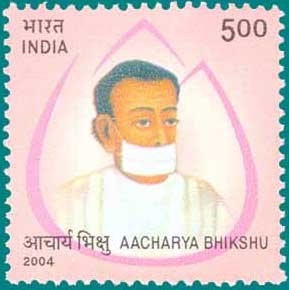Acharya Bhikshu (1726-1803)

Technical Data
| Date of Issue | June 30, 2004 |
|---|---|
| Denomination | Rs. 5 |
| Quantity | 400,000 |
| Perforation | comb 13 x 13½ |
| Printer | Security Printing Press, Nashik |
| Watermark | No Watermark |
| Colors | Multicolor |
| Catalog Codes |
Michel IN 2032 Stamp Number IN 2068 Yvert et Tellier IN 1794 Stanley Gibbons IN 2211 WADP Numbering System - WNS IN018.04 |
| Themes | Famous people | Literary People (Poets and Writers) | Men | Philosophers | Reformers |
Table of Contents
Aacharya Bhikshu (1726-1803)
Acharya Bhikshu, the founder of the Jain Swetamber Terapanth Sect, was a profound philosopher, religious reformer, poet, and social thinker who lived during a time of religious and intellectual turmoil. His life’s work was a reaction to the religious obscurantism and decadence that he observed, and he sought to cleanse society of exploitation, blind faith, and dogmatic practices.
Early Life
Birth:
Acharya Bhikshu was born in the village of Kantaliya, Pali district, Rajasthan, in the Vikram Samvat year 1783 (1726 CE). His parents were Shah Balluji Saklecha and Deepanji.
Personal Tragedy:
After the early death of his father and wife, Acharya Bhikshu turned to asceticism under the guidance of Acharya Raghunathji.
Founding the Terapanth Sect
Dissatisfaction with Religious Practices:
Bhikshu expressed deep dissatisfaction with conservative and ritualistic religious practices. This led him to establish the Terapanth religious Sangha on June 28, 1760, in Kelba, Mewar, Rajasthan.
Philosophical Vision:
Bhikshu was a strong advocate of purity in means for achieving goals. He believed that religion should not rely on fear of punishment or hope of reward but must bring about a transformation of the heart. He opposed violence in any form and championed the rights of weaker beings.
Contributions to Jainism and Society
Bhikshu Granth Ratnakar:
Bhikshu composed about 38,000 verses of spiritual and philosophical teachings, later compiled into two volumes known as the “Bhikshu Granth Ratnakar.”
“Nav Padarth Sadbhav”:
Among his works, the “Nav Padarth Sadbhav” is considered a significant text in Jain philosophy, discussing the nine gems of Jain thought and advocating for a society free of exploitation.
Social and Religious Reformer:
Bhikshu challenged existing social norms and encouraged the abandonment of superstition and religious exploitation. His teachings emphasized humanitarianism, secularism, and peace.
Acharya Bhikshu’s Legacy
Death:
Acharya Bhikshu attained eternal bliss in the Vikram Samvat year 1860 (1803 CE) at Siriyari, Rajasthan.
Continued Teachings:
The legacy of his reformist vision continues under the Terapanth Sangha, particularly under the guidance of Acharya Mahaprajna, the tenth Acharya, whose work on “Jeevan Vigyan” and “Preksha Dhyan” helped revive traditional meditation techniques useful for modern issues like stress and addiction.
Acharya Bhikshu’s teachings focused on truth, compassion, and social duty. His work continues to inspire the Terapanth community and society at large, emphasizing that religious and social goodness transcends caste, creed, or place.
